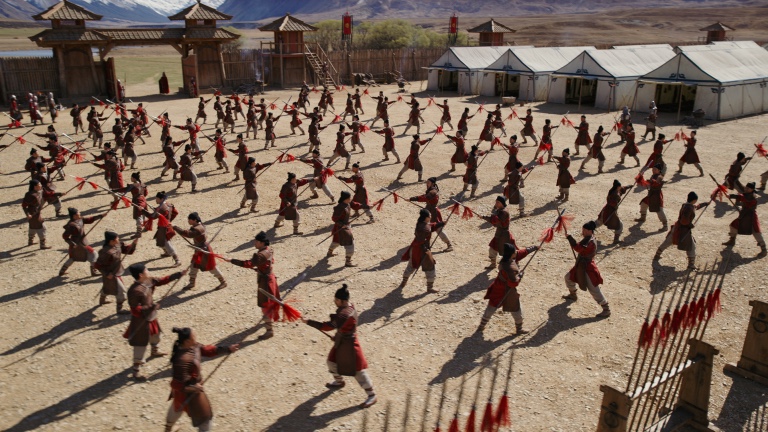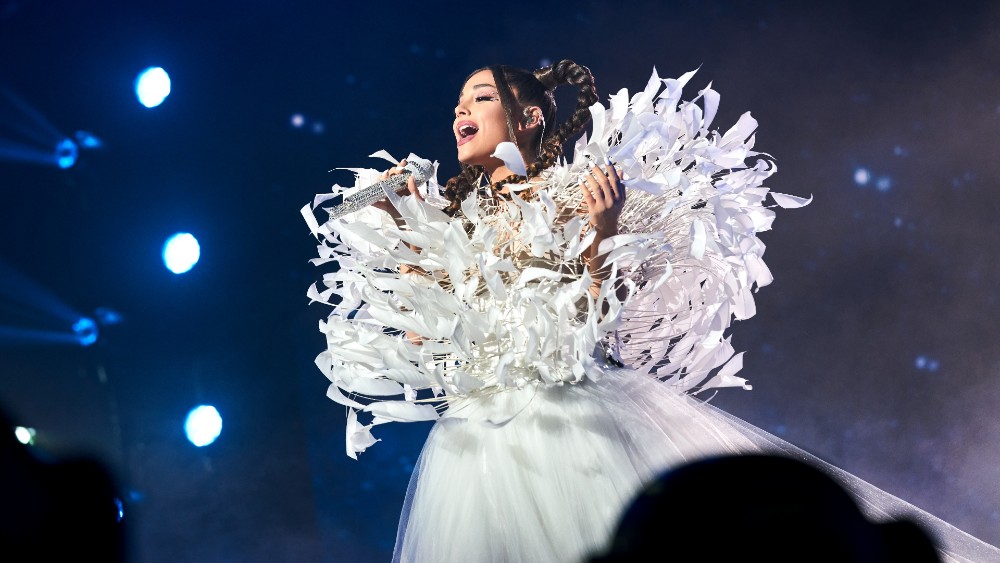
For some reason, Nicholas Britell still feels like the new kid on the block even though he’s been around for 17 years, and in that time, he’s scored three movies that have been nominated for Best Picture, including Barry Jenkins’ Moonlight, which won the top Oscar in 2016. Britell himself was nominated for two Oscars for scoring Moonlight and Jenkins’ follow-up film If Beale Street Could Talk.
And yet, it’s Britell’s work with Adam McKay that he’s best known for, having won an Emmy for scoring HBO’s hit series Succession, which boasts one of TV’s more memorable themes. Britell previously worked with McKay on The Big Short and Vice, so it was a no-brainer that they’d collaborate once again on the director’s latest film, Don’t Look Up, a rousing political comedy with one of the most impressive ensembles ever assembled — Oscar winners Leonardo DiCaprio, Jennifer Lawrence, Meryl Streep, Mark Rylance and Cate Blanchett, as well as Tyler Perry, Rob Morgan, Ron Perlman and past Oscar nominees Jonah Hill and Timothée Chalamet.
There are two additional members of the cast, Ariana Grande, and Scott Mescudi (aka Kid Cudi), who are part of the centerpiece of the film — a huge concert thrown in the hopes of alerting Americans to the enormous comet heading straight towards Earth with enough force to create an extinction-level event. It seems that everyone, including Streep’s POTUS, is in denial about the coming end of the world, so while Grande’s Riley Bina and Cudi’s DJ Chello perform the song “Just Look Up” to try and effect change, it proves to be something of fruitless pursuit.
Below the Line hopped on Zoom with Britell last week for a short conversation that mainly dealt with Don’t Look Up and co-writing “Just Look Up,” which has been shortlisted for an Oscar, with Grande, Kid Cudi, and Taura Stinson. Britell’s original score for the film has also been shortlisted. We also managed to sneak in a question about scoring Disney’s Cruella and all the cool needle drops built into that movie.
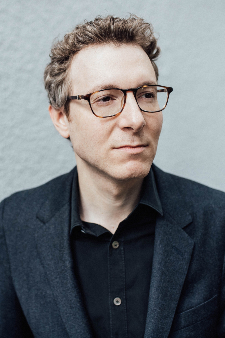
Below the Line: Tell me how you were first connected with Adam, which I believe was before Moonlight if I’m correct?
Nicholas Britell: It’s interesting, because you’re right. I met Barry while I was scoring The Big Short, [and] I met Adam because many years before that, I had met two amazing producers who had really been mentors to me and dear friends — Dede Gardner and Jeremy Kleiner from Plan B. I first collaborated with them and Steve McQueen on 12 Years a Slave, and we always stayed in touch. I believe it was the very end of 2014/beginning of 2015 when Jeremy told me that they were producing a film [based] on the Michael Lewis book, The Big Short.
I’d read the book, and I remember saying, ‘Jeremy, I’ll be honest, I think it’s a really hard movie to make. It’s really about these incredibly complicated financial products, but it’s an amazing book.”
Jeremy said, ‘Well, we have this really great script. Let me send it to you.” I remember reading the script that Adam and Charles had done. I was like, ‘Oh, my God, they did it. This is gonna be a fun movie, and it’s about finance, [and] collateralized debt obligations!” [laughs] Jeremy said, ‘If you love the script, would you like to talk to Adam?’
We jumped on the phone, and I remember it so vividly. From that first conversation talking to Adam, he was so fun to talk to. I mean, I was already a fan of Adam’s — my wife and I love Anchorman, we quote Anchorman to each other almost every day. I was a big fan of Adam’s for many, many years, but when I spoke with him, we had a great conversation. We spoke for about half an hour. I remember he said to me, thinking about the film, he said he’d love to know what the sound of dark mathematics is. ‘What’s that sound?’
I had an idea, so I said, ‘Let me play with that for a sec.’ So I went and I recorded this idea, and I sent it to him. He was just like, ‘you’re hired.’ [laughs]
And that piece, actually, that idea is in The Big Short. The biggest version of that theme is called “Redemption at the Roulette Table.” It’s when they’re leaving Vegas, and it’s this sort of overlapping, tessellating pianos, that was the first thing I wrote for Adam.
It was while I was working on The Big Short, I was having dinner with Jeremy and I remember him telling me about this script that they were producing, and he started to cry when he was talking about it, it was so beautiful.
And I said, ‘What is the script that you’re talking about?’ And he said, ‘It’s called Moonlight,’ and he sent it to me.
I immediately thought it was the most beautiful script I’d ever read. I thought it was a work of poetry. I said, “Look, I’d love to meet Barry if he wants to meet up sometime.” And so, Jeremy connected us, and in a way, it was because I was working on The Big Short and that we were so closely collaborating on that. You just never know, in life, how these things happen, but that is how I ended up meeting Barry.
BTL: Jumping into Don’t Look Up, it’s a lot bigger than the other two movies you’ve scored for Adam, with many different elements. Had he finished the script when he first told you about the concept, or did he give you an idea beforehand so you could start thinking about it?
Britell: He told me about it before and during, while he was writing it, and I did see versions of the script over time. So we were actively talking about it, and then, it was the end of the summer of 2020 that we started more actively trying to figure it out.
In the script there was that Riley Bina-DJ Chello concert, so we talked about it. He said, ‘They’re gonna do this song, and it has to be a love song, but it also has to turn into a song about [how] we’re all gonna die.’ [laughs] That’s an interesting challenge to write a love song that then becomes a song about the end of the world. Because I had to do the on-camera music, I actively began writing much earlier for Don’t Look Up than other projects we’ve done.
Actually, at the exact same time — because we were talking about the song — he said, ‘It would be really great if you could write a piece that I could play the actors on set, actually.’
I hadn’t done that for Adam before, but it was helpful, because I wrote a piece, imagining that feeling of reverence for science, for rationality, a sort of feeling of the higher aspirations of humankind, that kind of sense of awe-at-the-universe feeling. I wrote it, and I called it “The Overture to Logic and Knowledge,” and I sent it to Adam, and he really liked it. He played it for the actors during the telescope sequence at the beginning of the film. So that was the first sort of score piece I wrote for the film, and interestingly, you hear that piece in the film under the dinner table towards the end of the film. That’s where that piece actually plays.
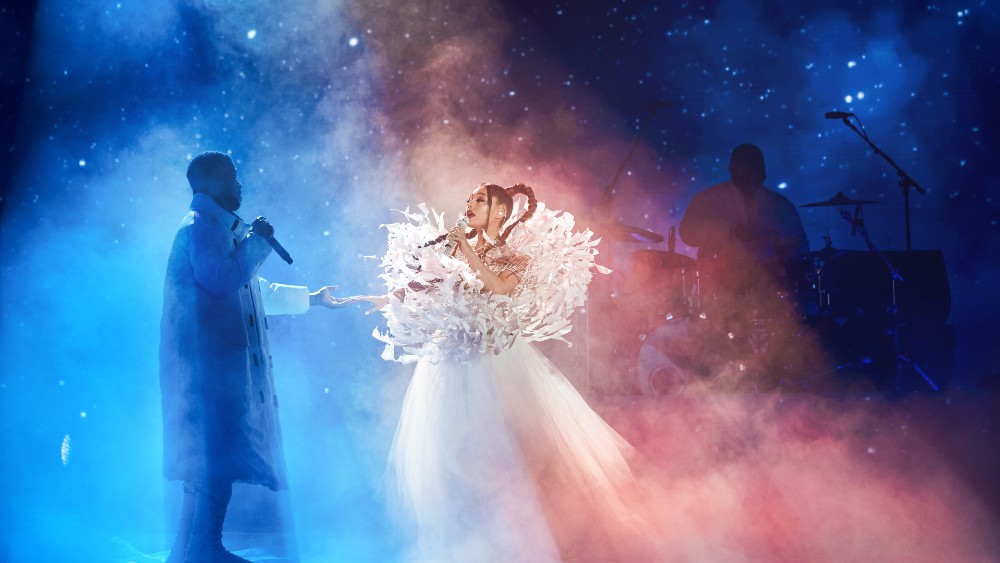
BTL: How did you start working on the song “Just Look Up” with Ari and Scott? I actually thought Adam might have been involved with the lyrics since they’re funny and so well-suited for the tone of the movie.
Britell: Adam had the idea for the song, and it was his conception that it was going to be this type of a thing. It doesn’t always happen this way, for sure, but there was a version of the script that I read, and I actually was thinking about the song. I finished the script, and I literally went over to the piano and wrote the song’s chords right away. It felt like it needed to be this kind of power ballad, in a way. It needed to be sort of a real, featured vocal song, but with a contemplative perspective, in a sense. Big, but also inward, that sort of set of feelings.
So I did the chords, I wrote the Just Look Upmelody, that [sings a few notes.] I wrote that melody, because the melody goes up, so I wanted that kind of upward sweep to it on the chorus. I mean, it was incredible. Adam was like, ‘Ariana Grande is Riley Bina.’ As soon as he liked my demo, he said, ‘You can go to her studio and show it to her.’
And I went over to the studio, played the chords for her on the piano there. About 30 seconds later, she just said, ‘Hey, can I go in the booth and try a couple [of] things out?’ The first pass, she did the entire top-line vocal of the song right away. It was one of the most amazing things I’ve ever seen. I was sitting there looking around the room being like, ‘Did that just happen?’ It sounded like we were done right away, but of course, no lyrics. She was just vocalizing over the whole thing, and she then improvised a couple of those lyrics like, ‘Because we’re all about to die soon.’ She came up with those, and when Adam heard that, he was like, ‘Oh, that’s staying in.’
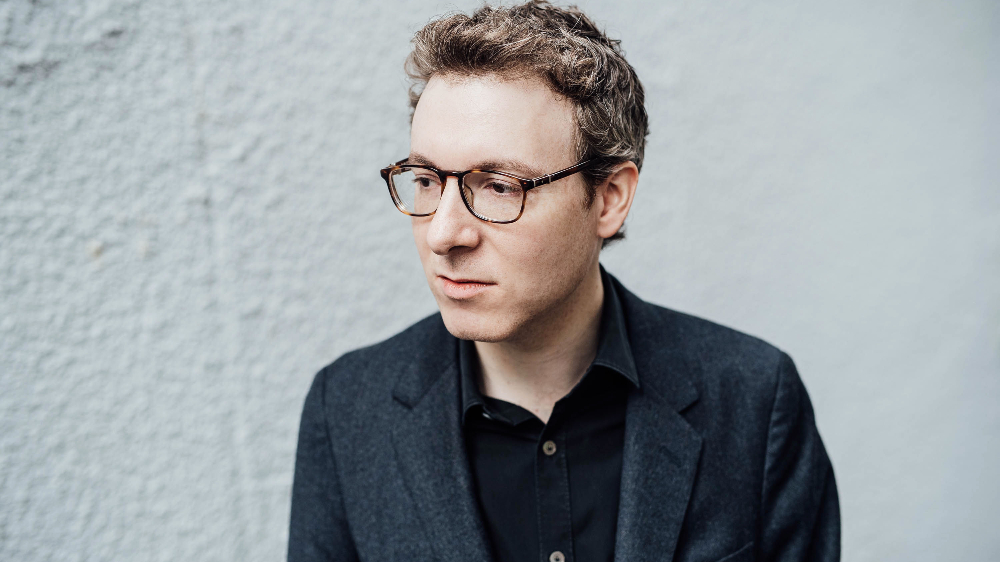
BTL: That’s actually the line I thought Adam might have contributed.
Britell: That was totally Ariana, who just came up with that in the booth, and then I took my demo chords with Ariana’s whole top line, and I reached out to Taura Stinson, who is such an incredible singer/songwriter. I gave her the challenge that we faced, with a love song that turns into a song about the end of the world, and again, just [a] remarkable first pass. She just nailed it, where you hear the lyrics in the song. That was her first pass that starts out as this Riley Bina/DJ Chello, their relationship, and then “got to listen to the qualified science,” it goes there. The transition point really was DJ Chello, was Kid Cudi.
Once Ariana had recorded Taura’s lyrics, while of course keeping her improvisations in there, I reached out to Scott, and I went to his studio. We worked together. He wrote his lyrics and his section that I’d set out there for him in the bridge where he can be featured. Again, it was really wonderful working with him, because he had such a sense of both thinking about DJ Chello, like, ‘I know I am DJ Chello here,’ but it’s also Kid Cudi, performing this, in a sense.
“It’s me as an artist, I have to actually do it.”
So that was wonderful. He had a very strong sense of what he wanted to do there.
As you know, these on-camera songs are a lot of work. We did all of that, then had to film it, and to their credit, they performed it live dozens of times on camera… like, dozens of times in Boston. Full performances of the song, and then editing it in — [Editor] Hank [Corwin] and Adam, figuring out a way to cut it in, and then also feature the other rally that’s going on at the [same] time in the movie.
And then, the final process was me finishing the production on it. I actually recorded the strings in the final chorus in London, with our orchestra, when I was doing the scoring sessions. I feel that, in the best case, an on-camera song should feel totally natural, hopefully, [so] that it just sort of feels like there’s a concert in the movie. But really, there’s so much that goes into it, and so many people that make it possible.
BTL: The rest of the score seems to have a lot of big band music, and it sounds like a real, live band, or is that just an illusion since it would be so hard to record a big band with COVID protocols and such? How did you decide on that sound and then record it?
Britell: That was a huge big band. I recorded that in London at AIR Studios. I was trying to find a sound that was really the opposite of that feeling of reverence and awe at the universe. What’s the feeling of a rollercoaster, flying off the top of a mountain or something like that? [laughs]
I had a conversation with Adam, where we were talking about climate change, and we were talking about how it really feels like we might lose this battle. It requires really, really immediate, huge action to reverse the course that we’re on, and I said to him,’ it feels like we’re in World War II, but we’re going to lose.’
And so I said to him, ‘What if I write, like, an old, wartime, big band track? But it’s a little crazy. What if I put in, like, banjos and toy piano. It’s dueling trumpets and all that?’ And he said, ‘Go for it.’
That was how that kind of idea came about. To your point, we recorded all [of] the score I recorded in London with an amazing string orchestra. We had almost a whole week of big band sessions, where I wrote the song, wrote all those big band tracks, all those pieces, and then recorded with a remarkable group of musicians there.
There [were] saxes and trumpets, and trombones and bass saxophone, and rhythm section… wonderful guitar. It was just a remarkable orchestra and band. I’ve worked with those musicians before. It’s a very, very similar group that recorded the Vice score with me, and we had a blast.
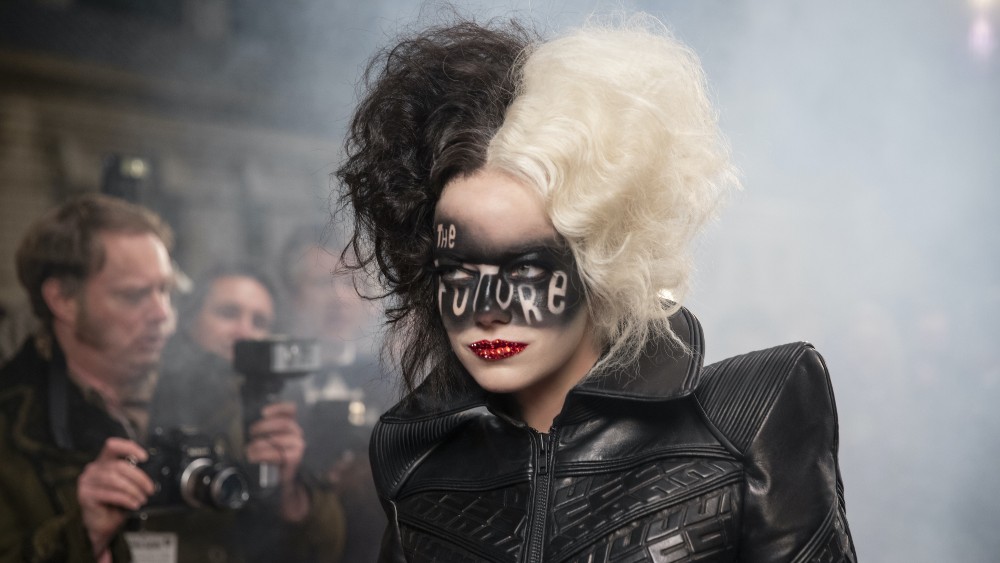
BTL: You scored Cruella, which featured lots of songs from the era, courtesy of the amazing Music Supervisor Susan Jacobs, who was able to get the rights to use all of those songs. Were you aware of the songs that were going to be in the movie early on, so that you could score around them?
Britell: Actually, when I first talked to Craig Gillespie, our director, and Sue, who’s wonderful, they knew they wanted to use a lot of that period British rock — London in the 70s –that feeling. I think the key challenge with the score was, ‘How do you write a score that feels like it can meld with that world, so it doesn’t feel like every time you go to a score cue, you’re losing energy?’ Or ‘How do you make the score feel cohesive while allowing for those songs?’
It was really a two-phase thing, where I actually wrote a lot of period rock. I recorded on tape with vintage instruments at Abbey Road in 2020, actually, and it was during the pandemic. I did an early phase over the summer and then fused that with some of these orchestral ideas. It was trying to blend those things and creating a sound that had sort of an edginess, hopefully, to that score sound that it could really meld, and I worked very closely with Craig and very closely with Sue.
Don’t Look Up is currently streaming on Netflix, while Cruella is streaming on Disney+ and Succession can be found on HBO Max. Watch the full performance of “Just Look Up” below:




